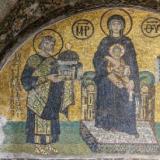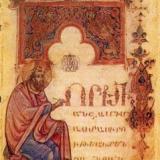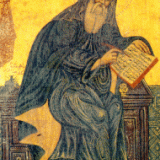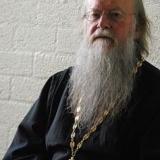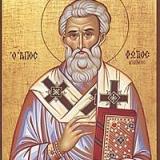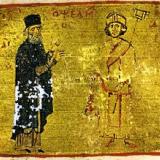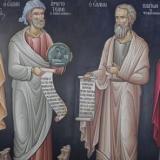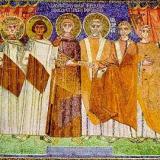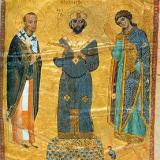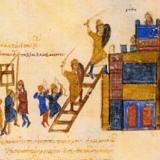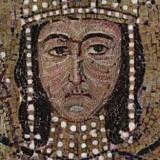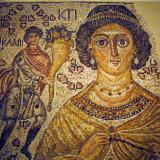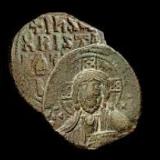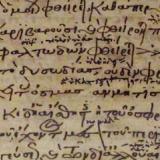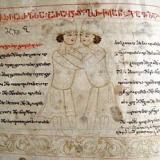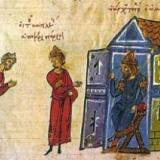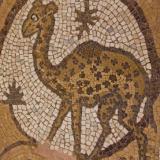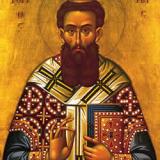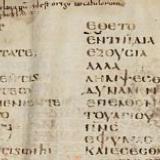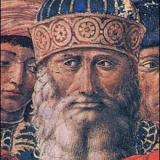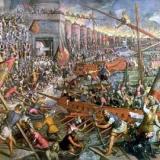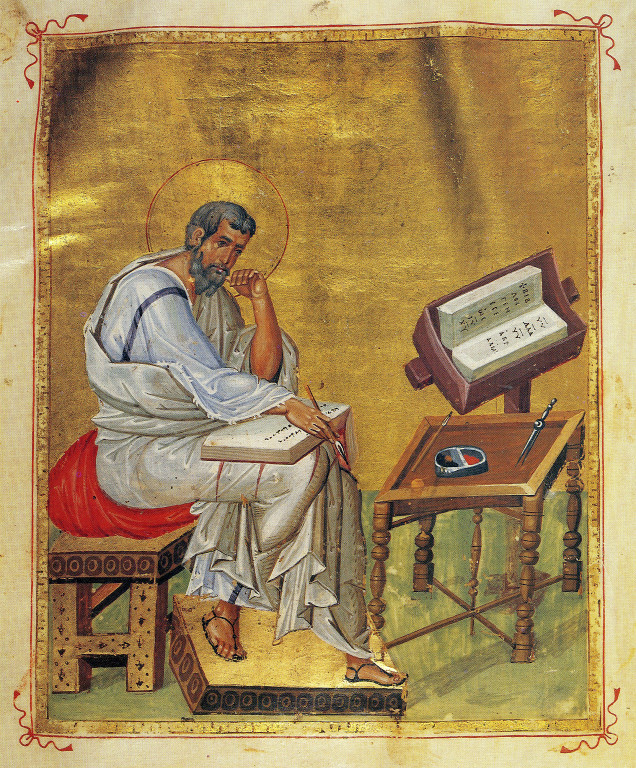Byzantine Philosophy
In this series we tackle the third of three parallel traditions which unfolded in the "medieval" period: philosophy in the Christian East. The main focus is on philosophy in Greek, produced above all in the capital of the Byzantine empire, Constantinople. We look at efforts to preserve and expound the Hellenic intellectual inheritance, and the debates that ensued as some thinkers were deemed to embrace pagan learning too eagerly. We also explore the philosophical interest of other aspects of Byzantine life like iconoclasm, religious movements such as Hesychasm, political theories, history writing, and women in positions of power. Attention is however also paid to other realms of Eastern Christianity, with traditions of writing in Syriac, Armenian, and Georgian. This series also features interviews with Katerina Ierodiakonou, Andrew Louth, Dominic O'Meara, Oliver Primavesi, and Michele Trizio.
• L.G. Benakis, Byzantine Philosophy: An Introductory Approach (Saarbrücken: 2017).
• B. Bydén and K. Ierodiakonou, “Greek philosophy”, in J. Marenbon (ed.), The Oxford Handbook of Medieval Philosophy (Oxford: 2012), 29–57.
• B. Bydén and K. Ierodiakonou (eds), The Many Faces of Byzantine Philosophy (Athens: 2012).
• M. Cacouros and M.-H. Congourdeau (eds), Philosophies et Sciences à Byzance de 1204 à 1453 (Leuven: 2006).
• L. James (ed.), A Companion to Byzantium, ed. Liz James (Chichester: 2010).
• E. Jeffreys et al. (eds), The Oxford Handbook of Byzantine Studies (Oxford: 2008).
• A. Kaldellis and N. Siniossoglou (eds), The Cambridge Intellectual History of Byzantium (Cambridge: 2017).
• A.P. Kazdan (ed.), The Oxford Dictionary of Byzantium (New York: 1991).
• S. Lazaris, A Companion to Byzantine Science (Leiden: 2020).
• F. Lauritzen and S. Klitenic Wear (eds), The Byzantine Platonists: 284-1453 (Washington DC: 2021).
• K. Ierodiakonou (ed.), Byzantine Philosophy and Its Ancient Sources (Oxford: 2002).
• K. Ierodiakonou and D. O’Meara “Byzantine philosophy,” in E. Jeffreys et al. (eds), The Oxford Handbook of Byzantine Studies (Oxford: 2008), 711–20.
• G. Kapriev, Philosophie in Byzanz (Würzburg: 2005).
• M. Knežvić (ed.), The Ways of Byzantine Philosophy (Alhambra CA: 2015).
• B. Tatakis, Byzantine Philosophy, trans. N.J. Moutafakis (Indianapolis: 2003).
• A. Rigo (ed.), Byzantine Theology and its Philosophical Background (Turnhout: 2011).
• K. Viglas, "A Historical Outline of Byzantine Philosophy and its Basic Subjects," Res Cogitans (2006), 73-105.
• N. Wilson, Scholars of Byzantium (London: 1983).
Online bibliography at Fordham.
Stanford Encyclopedia: Byzantine Philosophy
International Network for Byzantine Philosophy, an online forum for work by experts in the field.
"Webography" on Byzantine Philosophy with links to internet resources
Posted on
We begin to look at the third tradition of medieval philosophy, in which the heritage of classical antiquity is preserved and debated by the Byzantines.
Posted on
Eastern Christian philosophy outside of Constantinople, focusing on translation and exegesis in the languages of Syriac and Armenian.
Posted on
Is it idolatry to venerate an icon of a saint, or of Christ? The dispute leads the Byzantines to ponder the relation between an image and its object.
Posted on
John of Damascus helps to shape the Byzantine understanding of humankind and the veneration of images, despite living in Islamic territory.
Posted on
Peter is joined by Andrew Louth for a discussion of John of Damascus and his theological use of philosophy.
Posted on
Photius, “the inventor of the book review,” and other Byzantine scholars who preserved ancient learning.
Posted on
Michael Psellos and his attitude towards pagan philosophy and the political life.
Posted on
Dominic O'Meara speaks to Peter about Michael Psellos, focusing especially on his political philosophy.
Posted on
The trial of John Italos and other signs of Byzantine disquiet with the pagan philosophical tradition.
Posted on
Byzantine political thought from the time of Justinian down to the Palaiologos dynasty wrestles with the nature and scope of imperial power.
Posted on
Psellos and other experts in rhetoric explore how this art of persuasion relates to philosophy.
Posted on
The larger meaning of history in the chronicles written by Michael Psellos, Michael Attaleiates, Anna Komnene, and Niketas Choniates.
Posted on
Princess Anna Komnene makes good use of her political retirement by writing her Alexiad and gathering a circle of scholars to write commentaries on Aristotle.
Posted on
Katerina Ierodiakonou discusses Byzantine commentators on Aristotle, including Michael of Ephesus.
Posted on
The role of women in Byzantine society and the complex attitudes surrounding eunuchs: did they make up a “third gender”?
Posted on
Legal and economic thought in Byzantium: the sources of the law’s authority, the relation of church and civil law, just price, and just war.
Posted on
Without handwritten copies produced by Byzantine scribes, we would know almost nothing about ancient philosophy. How and why were they made?
Posted on
Oliver Primavesi tells us how Greek manuscripts are used to establish the text of authors like Aristotle.
Prof Primavesi runs the Munich School of Ancient Philosophy together with Christof Rapp and Peter Adamson.
Posted on
The Neoplatonist Proclus gets mixed reviews from Christians, as Nicholas of Methone refutes him but the Georgian philosopher Ioane Petritsi helps to revive his thought.
Posted on
Intellectual exchange between Christians and Muslims, and the later flowering of Syriac literature including the philosopher Bar Hebraeus.
Posted on
Historian Judith Herrin joins us to talk about competition and mutual influence between Islam and Byzantium.
Posted on
Mathematics and the sciences in Byzantium, focusing on scholars of the Palaiologan period like Blemmydes and Metochites.
Posted on
Gregory Palamas and the controversy over his teaching that we can go beyond human reason by grasping God through his activities or “energies”.
Posted on
Thomas Aquinas finds avid readers among Byzantines at the twilight of empire, and is used by both sides of the Hesychast controversy.
Posted on
Was Gemistos Plethon, the last great thinker of the Byzantine tradition, a secret pagan or just a Christian with an unusual enthusiasm for Platonism?
Posted on
When the Byzantine empire ended in 1453, philosophy in Greek did not end with it. In this episode we bring the story up to the 20th century.
Posted on
The series on Byzantium concludes as guest Michele Trizio discusses the mutual influence of Byzantium and Latin Christendom.




